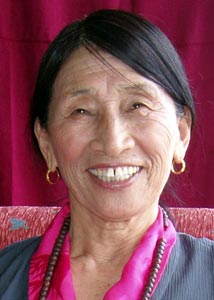Name: Cho Lhamo
(Alias: No)
Gender: Female
Interview Age: 65
Date of Birth: 1941
Birthplace: Kongpo Tham-nyen, Kham, Tibet
Year Left Tibet: 1960
Profession: Farming
Monk/Nun: No
Political Prisoner: No

Interview No.: 92
Date: 2006-06-02
Language: Tibetan
Location: San Francisco, California, United States
Categories: Chinese Invasion and Occupation
Keywords: brutality/torture, childhood memories, children's games, Chinese -- first appearance of, Chinese rule -- life under, environment/wildlife, escape experiences, Kham, resistance fighters, thamzing/struggle sessions
Summary:
Cho Lhamo was born in Kongpo Tham-nyen to a Khampa father and a Kongpo mother. She recalls her childhood days as being extremely happy. She played games, rode horses, danced, sang and dressed like boys to play pranks on other girls. Cho Lhamo married at the age of 21. She fondly describes her village as a very beautiful place with mountains, forests, fruit trees and big rivers.
When the Chinese came to Cho Lhamo's village, they were initially friendly. Then, gradually, life under Chinese control became more oppressive. Cho Lhamo's family was targeted for arrest and torture so they tried to escape. She and her mother were captured by the Chinese and her father was killed.
Cho Lhamo and her mother were allowed to return home if they agreed to changer their "way of thinking." Their second attempt to escape was successful and Cho Lhamo and her family finally reached India. On the way the family met His Holiness the Penor Rinpoche, who was then at Pema Koe near the Indian border. Cho Lhamo travelled to Tibet in 1987 and was able to visit her relatives.
Interview Team:
- Marcella Adamski (Interviewer)
- Tashi Chodron (Interpreter)
- Kerry Rose (Videographer)
Link: N/A
Topic: N/A
Length: 02:49:03

